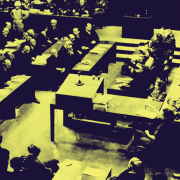
Between December 18-19, 2019 SICSA held an international workshop on Witnessing the Witness after 1945: on War Crimes, Mass Murder, and Genocide, organized by Prof. Manuela Consonni, SICSA's Director, and Prof. Philip Nord from Princeton University.
Taking the post war trials as a point of departure and of the reformulation of the question of the witness, but touching upon a broader spectrum of trials, the workshop concentrated on Holocaust issues only as they are related to questions of ‘post-war’ trials of war crimes, mass murder, and genocide. The epistemological crisis of language and its representational value and the tragic historical events that took place during the 1900s placed not only the testimony as such but also and above all its limits in relation to truth (the White-Vidal-Naquet-Ginzburg debate on history rhetoric and proof) at the center of attention. By this sentence, we want to argue that at stake there is not only the question of the limits of representation imbued in the witnessing but also its validity out of trial courts. Was does it mean, within this context, Paul Celan’s famous verse "no one / bears witness for the / witness," which has become a common motto of theoretical approaches that tend to emphasize the impossibility of an ultimate testimony in the most extreme events. Does such motto possess any validity but within a legal context? And how can we examine the Wilkomirski case or other fraud testimonial cases?
The concepts of testimony and witness lend themselves to be addressed in different ways from the different points of view of heterogeneous disciplinary fields. In the legal sphere, they have specific technical meanings within a legal procedure, while they assume a more widespread (without, however, becoming too vague) and complex meanings in historical, philosophical, and literary contexts
The debate concerning the validity of the witness has been, particularly heated concerning Shoah’s testimonies (Giorgio Agamben, Georges Didi-Huberman, Ulrich Baer, among others), but is not limited to it. The workshop shall intend to reflect on the notion of testimony, replacing it within the context of the post war trials, thus regaining its hermeneutic value, or, if you want, its original value, that calls into question fundamental issues related to concepts of truth, historical knowledge, the communicability and transmissibility of individual experience, and consequently the possibility of creating a common historical and cognitive horizon.




